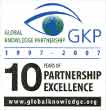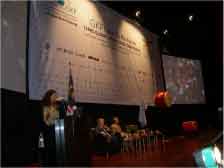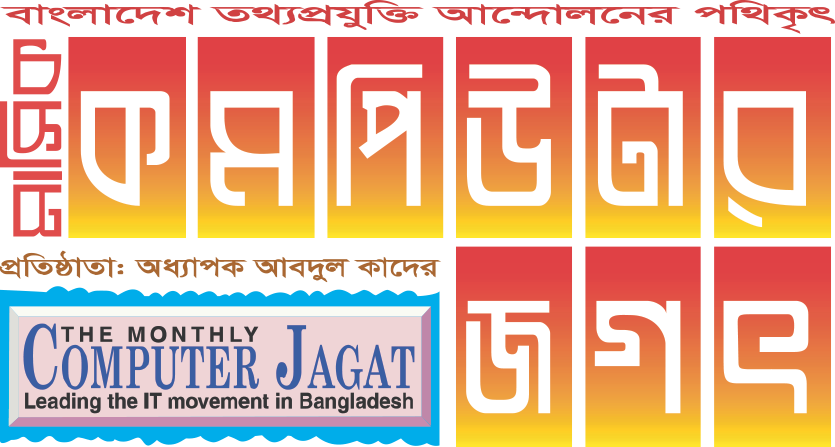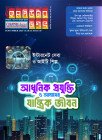হোম > English section
লেখক পরিচিতি
লেখকের নাম:
এম. এ. হক অনু
মোট লেখা:১৬
লেখকের নাম:
মো: কায়সার উদ্দিন
মোট লেখা:৩
লেখা সম্পর্কিত
পাবলিশ:
২০০৮ - জানুয়ারী
তথ্যসূত্র:
কমপিউটার জগৎ
লেখার ধরণ:
জিকে৩
তথ্যসূত্র:
ইংরেজি সেকশন
ভাষা:
বাংলা
স্বত্ত্ব:
কমপিউটার জগৎ
English section
GK3 Ends With a Grand Success
M. A. Haque Anu and Mohammad Kawsar Uddin
Back from Kuala Lumpur, Malaysia

Global Knowledge Partnership (GKP) is the worlds first multi-stakeholder network in the area of ICT for development. Estab-lished in 1997 with a mission to share knowledge and build partnerships, GKP connects organizations across sectors and regions to promote knowledge and innovation in the use of ICT for development. GKP is governed by its members and supported by a global Secretariat based in Kuala Lumpur, Malaysia. Now, GKP is an international network of over 100 organizations from all sectors like public, private and civil society. Members and partners work in concerned through the GKP network to promote innovation and advancement in Knowledge for Development (K4D) and Information and Communication Technologies for Development (ICT4D) in seven operating regions: Africa, Central and Eastern Europe, East Asia, Latin America and the Caribbean, Middle East and North Africa, Oceania and South Asia. More than 40 organization like UNESCO, Telectre.org, IDRC, Microsoft, Intel, Panos South Asia showcasing their activities in the GK3 premises.

PC. Rinalia Abdul Rahim speaks at the GK3 openning ceremony
The first Global Knowledge Conference (GK1) held in Toronto, Canada in the year 1997 and second Global Knowledge Conference (GK2) held in Kuala Lumpur, Malaysia in 2000. In this process the GKP Event on the Future, Third Global Knowledge Conference (GK3) also held in Kuala Lumpur, Malaysia from December 11-13, 2007. The theme of the conference was ÔEmerging People, Emerging Markets and Emerging Technologies.

A view of the GK3 fair
Total of 1,766 registered participants from 135 countries attended the third Global Knowledge Conference (GK3), comprising 19% from public sector, 21% from private sector, 29% from civil society, 20% from international organizations, 5% from media and 6% from academia. 82% of participants were from developing countries while women and youth made up 38% and 23%, respectively. 50% of participants hailed from Asia and Oceania, 5% from the Arab world, 9% from Commonwealth independent nations, 14% from the African continent, 5% from Latin America and the Caribbean and 17% from North America and Europe. Through 3 days interactions, debates and discussions, certain threads of ÔEmerging People, Emerging Markets, Emerging Technologies surfaced which can guide the ICT4D community in continuing to address the challenges and reap opportunities in development.
In the closing speech of GK3, Walter Fust, Chair of the Executive Committee, Global Knowledge Partnership and Director-General, Swiss Agency for Development and Cooperation said the GKP conference has proved itself to be a vital organ in the evolution of Knowledge and development through the various initiatives taken up by its members. It is also showing itself to be a vehicle for change (for the better) in many sectors, not the least of which being Education and ICTs. He said during these days we have witnessed the initiatives, youthfulness and drive of the 100 young social entrepreneurs.
At that time Rinalia Abdul Rahim, Executive Director of Global Knowledge Partnership & Chair of the GK3 Working Committee said, if GKP members have found new partners and initiatives, I think that gives us encouragement to move forward. The GK3 conference had objectives and they were all fulfilled. The objectives included: Expand and build partnerships, and Grow the Global Knowledge community Emerging People: Three communities play paramount importance in achieving sustainable and equitable development - youth, women and migrants. Youth are the future and deserve increased opportunities. Women must benefit from ICT not only from an early age but also through lifelong education opportunities and must be given equal opportunities to compete successfully in the labour market or to lead enterprises. ICT is pivotal for migrants to remain connected in a globalizing world economy.
Emerging Markets: Three market elements are fundamental to drive development - access, effective use of ICT and governance. Access to the Internet is expected to reach the next 5 billion people by 2015, which will create enormous market opportunities and new jobs. Effective use of ICT not only connects partners locally, regionally and globally but creates new markets. More transparent, accountable, effective and efficient governance systems put in place by ICT are prerequisites for sound policies to support growth and creation of new markets.
Emerging Technologies: Four future-oriented outlook involving technologies were highlighted - media, cybersecurity, low cost devices and green technologies. Increased convergence of different media allows single broadcasting (one to many) to be complemented by social broadcasting (many to many) and in turn increases interactivity in the exchange of information. Cybersecurity, cybercrimes and cyberwaste are becoming real dangers which deserve special attention. More new low cost devices are needed to facilitate affordable access to information, knowledge, communication and new forms of learning. Demand for innovative green technologies is welcomed and growing. With respect to the Cross-Cutting Themes, emphasis was drawn on innovation, entrepreneurship and education. ICT offers growing opportunities for innovation through facilitation of peer-to-peer knowledge sharing and collaboration. Promoting entrepreneurship as part of early education schemes must be promoted. Education is crucial for development and ICT can make a difference in terms of quality, quantity and availability.
These were some of the initiatives announced at GK3, like Mission 2011, Cyberpeace Initiative, iMalls, e-Agriculture.org platform, Guidelines on e-Government Interoperability Framework (e-GIF) and Open Standards, Escuelas Interactivas (Interactive Schools) in Equador, Pan Africa L10N Network, ICT Caravan Project, Cybervolunteerism , Egyptian Education Initiative, TechSoup Global, Development Gateway Chinese Portal.
100 Young Social Entrepreneurs were awarded in the GK3. Among the 100 Entrepreneurs, 4 Entrepreneurs awarded from Bangladesh. They are Tauhidol Alam of Coastal Rural Knowledge Centre, A.K.M Ganiul Zadid of Info (Bd) Next, Hasan Shahriar of Jono Tottho-Ghar (Peoples Information Center) and Khan Md. Anwarus Salam of Vubon dot com.
From Bangladesh more than 40 participant including six GKP members of Bangladesh participated in the conference. The GKP members from Bangladesh are Bangladesh Friendship Education Society (BFES), Development Research Network (D.Net), Bangladesh NGOs Network for Radio and Communication (BNNRC), Bangladesh Association of Software and Information Services (BASIS), Akota Trade Fair and Drik Net. Bangladeshi participants highlighted their activities in the GK3.
Mission 2011 of Bangladesh Tele-centre Network (BTN) was introduced to the audience of Global Knoweldge Conference trough an International Launch ceremony at GKP Pavillion. High Commissioner of Bangladesh to Malaysia Khairuzzaman was present as the Chief Guest of the occasion and announced an International Launch of Mission 2011. The session was conducted by Dr. Ananya Raihan from BTN Secretariat and Shahid Uddin Akbar from Katalyst. Akhtar A. Badshah from Microsoft attended the event as the special guest. In his speech Khairuzzaman called upon Internatio-nal Community for supporting BTN in realising the plan of establishment of 40,000 telecentres at the 40th anniver-sary of Bangladeshs Independence. The launch was also addressed by Manish Pandey, Deputy General Manager of Katalyst, Karar Mahmudul Hasan, former Secretary for Ministry of Science and ICT, Dr. Basheerhamad Shadrach of IDRC, Professor Subiah Arunachalam of MSSRF.
The Bangla version of Telecentre Times was launched at GK3 by its Editor A H M Bazlur Rahman, CEO of BNNRC at the telecentre village. It is to be mentioned that the global version of Telecentre Times is a joint product of D.Net, Bangladesh, UgaBYTES of Uganda, Sarvodoya of Sri Lanka and telecentre.org. The English version was launched in Colombo in May 2006 and first issue was launched in Rangpur, Bangladesh during the International Workshop on Building Telecentre Family in Bangladesh held in August 2006. The launch programme was conducted by Partha Sarkar of IDRC.
At the concluding session of GKP members the handbook titled ÔTowards Knowledge Society: A Handbook of Selected ICT4D Initiatives in South AsiaÓ was launched by Walter Fust, Chairperson of GKP and Rinalia Abdul Rahim, Executive Director of GKP. The four GKP members representatives Dr. Ananya Raihan, Executive Director, D.Net, Ms. Shikha Shrestha of bellanet, Nepal, Ravi Gupta, Executive Director of CSDMS, India and Harsha Lianage, Managing Director of Sarvodoya-Fusion were present at the launching programme. Dr. Shah M. Ahsan Habib, Research Director of D.Net and editor of the handbook conducted the launch programme. It is to be mentioned that the handbook is the first one of a series of ICT4D casestudies in South Asia, initiated by South Asian members of GKP during GKP annual general meeting in Colombo in May 2006.
Before this in the opening ceremony of GK3, in her Welcome Address Rinalia Abdul Rahim, told, the diversity represents global knowledge and if everyone try to share their knowledge actively in the next few days, we can address the challenges of the future more effectively. She said, The world faces many global challenges from man-made conflicts in many parts of the world, to growing unemployment as global population grows, to the persistence of illiteracy and poverty worldwide and to global warming, possibly our greatest challenge to date. Where climate change is concerned, scientists are saying that the world is going to tip into a different mode of existence. She said, we need visions of a better future, we need knowledge and technological innovation, we need the willingness to change and we need the cooperation from all segments of society to work together in partnership. By this kind of conference Policy makers learn from grassroots perspectives and vice versa. Developed countries learn from developing countries and vice versa. Third Global Knowledge conference (Gk3) sponsored by Swiss Agency for Development and Cooperation (SDC), International Development Research Centre (IDRC), Microsoft, Canadian International Development Agency, SIDA, UNESCO, Nokia Siemens Network, Telecom Malaysia, Ministry of Energy, Water and Communication; Malaysia, Al-Jazeera Childrens Channel, Information and Communication agency of Srilanka.
.............................................................................
Surely the Solution of Hunger Problem is Availability of knowledge for the Mass People

Walter Fust
Chairman of the Board, GKP
Director-General, SDC
GK3 has just concluded, what is your impression about it, could it achieve its objective?
When we planned GK3, we want to start a series of event which think the future, most of them analyze the present, thats why we choose the title Emerging People, Emerging Markets and Emerging Technologies. Now I think, It was composed in a manner to offered multiple opportunities of people being interested in one or another subject. It concerned only achieve the objectives to bring the people together. We could also achieve, I think the objective to make people aware about different trends and different new opportunities at what the consent like we cannot do in of course bring the solution, so that was also not our objective. But to think the future, this is not enough we has to make it and we hope that many of the participants are going home with some ideas to make their work and activities more successful and go to new direction. Actually achievement is a continuous process thats why we arrange three day gathering to share understanding of different stack holders with each other.
What is more important for the poor people in the world, food or connectivity? Can knowledge society resolve the problem of world hunger?
If you are not eating then you are not healthy. If are not healthy, you can not learn and you can not work. Then come in the whole issue of information, access and knowledge, though it is a part of this overall package of creating prospective it is not so much the issue whether what is more important and the other. It is a matter of complexity doing, Now I have meet lot of people they say look we have arrange to live in poverty but we would never expect to be excluded information and knowledge. Knowledge become at the given edge, at the given moment something like food. Food for thought, food for new activities, food for new plan and you can not replace it physically.
I am sure that to solve the problem of hunger, knowledge have to be available. It is man made so man can find the solution.
After 10 years from now, how do you envisage the global technology scenario? I think the infrastructure for telecommunication will be very widely expended. The infrastructure will be substantially better from today and that we shift from the cost effective ability to low cost of service provision. May be you have not pay for access along, you only have to pay for services when you use the infrastructure not for access. If you think about the school, the teacher they should have free access to internet.
You are the mastermind of GKP, after 10 years how do you feel, could GKP fulfill your dream? It fulfill my dream in conniving people and it could fulfill the dream of better awareness. But we are still far away from showing the relevance of importance of IT people give development through the wider role and through the decision maker. There are still many politician who do not yet fill the importance of Information and Communication Technology for sustainable development. So, still have a lot to do in communication. We need to aware that by this tools we can change our society, by this tool we change the way of communication. ICT make the world much more easier.
What is the greatest success and biggest failure during your leadership?
I think the success is that hundreds of different partnership increasing and work together or initiative like the international network for langu-age diversity or the creation of the Young Social Entrepreneurs fund.
Failure is it took have too long time to bring ICT in the political agenda. We promise it in the Geneva, World Summit on Information Society (WSIS). I could not say it is a failure, it take more times then we expected to do. But we did it. Now it is on the political agenda, but it is not yet on the agenda of private sector outside the IT sector or in the development practice or those who finance development. They have heared about the ICT, they see about something important here but many country go through there own poverty reduction strategy, do not enthasize the importance of the ICT4D yet but you plan your own poverty reduction strategy in country level you have to think how ICT can help in your work properly. If you think about education, there ICT has a very important role. Still we have to address this kind of cross cutting issue properly.
Bangladesh plans to build up 40 thousand telecentres by 2011? How can SDC and GKP can support this initiative?
I am very much impressed to know the initiative of mission 2011 and looking forward to see their activities. I only hope you will be able to mobilize the resources and to the capacity building to organizing. To have a Telecentre in one chance useful to provide the content relevant information to the people. This is good to see the country like Bangladesh follow the initiative of India like mission 2007. I think the telecentre initiative is one of the fastest movement we have experience over the couple of years. The UNGAID, I am a member of the stiaring committee chairman is Craig Barret, we take a initiative to build 100 thousand telecenters by 2012 across the globe.
We do for example the Telecntre.org is financed partly invested us 5 million USD, Microsoft contribute smaller amount and IDRC about the same amount. We also negotiate for more fund. We can provide financial support, training and capacity building through our bilateral co-operation strategy. Bangladesh is not yet there. Your government is to take initiative for this.
What is your opinion about Bangladeshs ICT4D? What is your wish for Bangladeshs ICT4D community?
I know that in your country many effort are on the way. I think Bangladesh has responded very well to the challenge and to the recognition of ICT and knowledge economy. You have a lot of well-trained people. What India have done, now Bangladesh have to be come as software supplier and became a assembler or producer of devices.
My wish for the community to brings ICT in the development agenda, in the industrial development agenda, in the economic development agenda. I hope 160 million people of Bangladesh take the benefit by use ICT as a development tool.
If Bangladesh government offers you honorary citizenship, will you accept it?
We have rule as government servant that we should not accept such kind of citizenship. But when I retired from my job, I can think about it.
লেখাটি পিডিএফ ফর্মেটে ডাউনলোড করুন
পাঠকের মন্তব্য




